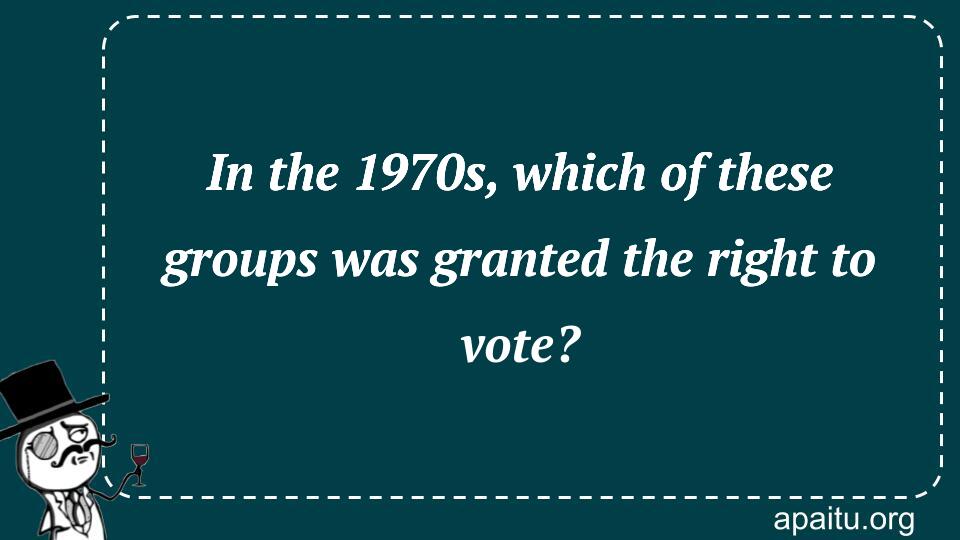Question
Here is the question : IN THE 1970S, WHICH OF THESE GROUPS WAS GRANTED THE RIGHT TO VOTE?
Option
Here is the option for the question :
- Noncitizens
- 18-year-olds
- Felons
- Asian Americans
The Answer:
And, the answer for the the question is :
Explanation:
The phrase “old enough to fight, old enough to vote” became a rallying cry during the Vietnam War in the late 1960s, drawing attention to the fact that young Americans may be drafted and sent to war at the age of 18, but they could not vote until they were 21. Lowering the voting age was supported by President Richard Nixon, and the 26th Amendment was passed into law in 1971.

In the 1970s, a significant milestone in American democracy occurred when the right to vote was extended to a previously excluded group: 18-year-olds. This expansion of voting rights marked a major shift in the political landscape and had a profound impact on young people across the nation. In this article, we explore the historical context, motivations behind the change, and the implications of granting 18-year-olds the right to vote.
Prior to the 1970s, the voting age in the United States varied among states, with most states setting the minimum age at 21. This meant that young adults between the ages of 18 and 20 were not eligible to participate in the democratic process. However, the Vietnam War and the draft played a crucial role in reshaping the conversation surrounding voting rights.
The Vietnam War, which lasted from 1955 to 1975, brought the issue of the voting age to the forefront of public consciousness. Young men aged 18 were being drafted and sent to fight in a war, yet they were denied the right to vote for the leaders who were making decisions about their lives and futures. This sparked a wave of activism and calls for change.
The movement to lower the voting age gained momentum throughout the 1960s as young people became increasingly involved in political activism and civil rights movements. The argument was grounded in the belief that if 18-year-olds were old enough to be drafted into military service and risk their lives, then they should also have the right to vote.
In response to this growing sentiment, Congress took action. In 1971, the 26th Amendment to the United States Constitution was ratified, officially lowering the voting age to 18 for all federal, state, and local elections. This marked a significant milestone in American history, as it enfranchised millions of young people who previously had no voice in the political process.
The implications of granting 18-year-olds the right to vote were profound. It gave young adults the opportunity to participate directly in shaping the policies and decisions that would impact their lives. The inclusion of 18-year-olds in the electorate brought fresh perspectives, energy, and concerns to the political arena. It also signaled a recognition of the importance of young voices and their potential to effect change.
The impact of this change was felt immediately. In the 1972 presidential election, the first in which 18-year-olds were eligible to vote, their participation was significant. Young voters demonstrated a newfound sense of political engagement and played a role in shaping the outcome of the election. This trend continued in subsequent elections, with young voters becoming an increasingly influential demographic.
The enfranchisement of 18-year-olds also had broader societal implications. It highlighted the importance of youth voices in shaping the future of the country and encouraged young people to take an active interest in politics and civic engagement. The expansion of voting rights to 18-year-olds helped foster a sense of empowerment and civic responsibility among young adults, inspiring them to become more politically aware and involved.
Furthermore, the change in the voting age had a ripple effect, leading to discussions about the legal and social rights and responsibilities associated with adulthood. It sparked conversations about the age at which individuals are considered mature and capable of making informed decisions on various matters.
the 1970s witnessed a significant expansion of voting rights in the United States, as the right to vote was granted to 18-year-olds. This change was driven by the recognition of the sacrifices made by young people during the Vietnam War and the desire to ensure that they had a say in shaping their own future. The enfranchisement of 18-year-olds marked a pivotal moment in American democracy, empowering young adults and emphasizing the importance of their voices in the political process.